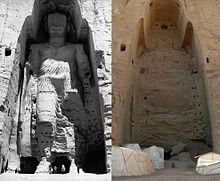Taliban
![]()
This article is about the Islamic Taliban Movement of Afghanistan. For the Pakistani organization of the same name, see Tehrik-i-Taliban Pakistan.
![]()
The neutrality of this article or section is disputed. A justification can be found on the discussion page in the section "Revise module". For more information, click here.
The Taliban, sometimes also Taleban (Pashto د افغانستان د طالبان اسلامی تحریکِ DMG Da Afġānistān da Ṭālibān Islāmī Taḥrīk, German 'The Islamic Taliban Movement of Afghanistan'), are a deoband Islamist terrorist group that first controlled large parts of Afghanistan from September 1996 to October 2001. The name (Persian طالبان, DMG ṭālibān) is the Persian plural form of the Arabic-derived word talib (طالب, DMG ṭālib 'disciple, seeker', plural طلاب, DMG ṭullāb, also طلبة, DMG ṭalaba). Diplomatically, the Taliban's Islamic Emirate of Afghanistan was recognized only by Pakistan, Saudi Arabia, and the United Arab Emirates.
The Taliban movement has its origins in religious schools for Afghan refugees in Pakistan, which were mostly run by the Pakistani political party Jamiat Ulema-e-Islam. The movement's ideology is based on an extreme form of Deobandism and is also heavily influenced by the Pashtun code of law and honor, Pashtunwali. The leader of the Taliban until 2013 was Mullah Mohammed Omar. Omar's successor, Akhtar Mansur, was killed in a drone strike in 2016. Mansur's successor is Haibatullah Achundsada.
The Taliban first appeared in the southern city of Kandahar in 1994. They besieged and shelled the capital Kabul for two years, capturing it in September 1996 and establishing the Islamic Emirate of Afghanistan. In October 2001, their government was overthrown by Afghan United Front troops in cooperation with U.S. and British Special Forces during the U.S.-led intervention in Afghanistan. Their leaders were able to hold on by retreating to Pakistan. Since 2003, the Taliban have waged a terrorist-military campaign, starting in Pakistan, against the democratic Islamic Republic of Afghanistan and ISAF international troops in Afghanistan. In this campaign, the Taliban are more than twice as likely to carry out targeted attacks against Afghan civilians as against Afghan or international troops. A United Nations report shows that the Taliban were responsible for over ¾ of civilian deaths in Afghanistan in 2009 and 2010. Human rights organizations have led the International Criminal Court in The Hague to conduct a preliminary investigation into the Taliban for systematic war crimes.
Organization
Current leadership
As of 2021, the Taliban leadership consists of several regional decision-making bodies (Shūrā), named after the Pakistani cities in which they are located: Quetta Shura, Miranshah Shura, Peshawar Shura.
Those cities, according to Afghan President Ashraf Ghani, are home to the Taliban's financial and logistics departments and personnel recruitment.
Leadership in the past
The Supreme Shūrā of the founding members of the Taliban included the following members during the period 1994 to 1997:
- Mullah Mohammed Omar (1960-2013), leader of the faithful and head of the Taliban movement, as of September 1996 also head of state of the Islamic Emirate of Afghanistan
- Mullah Mohammad Rabbani Akhund (1955/56-2001), head of government and deputy head of the Taliban movement
- Mullah Mohammed Ghous Akhund (* 1965), Foreign Minister until June 1997
- Mullah Mohammed Hassan Akhund (b. 1958?), military chief of staff, foreign minister before Wakil Ahmad Mutawakil and governor of Kandahar during the Taliban regime
- Mullah Mohammed Fazil Akhund (b. 1967), head of the army corps
- Mullah Abdur Razzaq (b. 1966), head of the customs authority
- Mullah Sayed Ghiasuddin Agha (1960-2003), Minister of Information
- Mullah Khirullah Said Wali Khairkhwa (b. 1967), Interior Minister
- Maulvi Abdul Sattar Sanani (or: Sattar Sadozai), Minister of Justice
- Mullah Abdul Jalil (* 1961), Foreign Minister as of 1997
Ideology
Overview
The Taliban themselves belong more to the ideological school of the Deobandis, a fundamentalist group headquartered in Deoband, India. The Peshawar madrassa, the largest Pakistani offshoot of the Dar-ul-'Ulum-Haqqania madrassa, recruited many senior Taliban. The political branch and supporter of the Deobandis' schools is the Jamiat Ulema-e-Islam party in Pakistan. The U.S. called on the Pakistani government to close these religious schools (madrasas). However, they are not officially registered in Pakistan. In 2007, Pakistan's Ministry of Interior estimated their number at about 13,500; other estimates put it at 20,000. The relationship between the Sunni Taliban and the country's Shiite minorities is considered strained, although there are isolated Shiites in the ranks of the Taliban.[]
In the self-image conveyed by a Taliban spokesman in Doha in 2019, the Taliban are Afghanistan, so they do not see themselves as a part of the state, but as the state itself.
Oppression of women
During the Taliban's reign in the Islamic Emirate of Afghanistan from 1996 to 2001, its system of oppressing women gained worldwide notoriety. The Taliban's stated goal was to create a "safe environment for women in which their chastity and dignity would once again be inviolable." Women were forced to wear the burqa in public because, as a Taliban spokesman put it, "a woman's face is a source of corruption for men unrelated to her." Women were forbidden to work, and they were not allowed to be educated after the age of eight.
Apparently, and according to statements made by a Taliban press spokesman in 2019, there is an understanding that female professionals are indispensable, at least in medical professions. A Taliban press spokesman from Ghazni province commented in the ZDF documentary Eine gefährliche Mission: Unterwegs mit den Taliban in Afghanistan that girls and women also had a right to education under the Taliban.
→ Main article: Women's rights under the Taliban
Destruction of international cultural heritage
The Taliban deliberately destroyed cultural relics that they deemed un-Islamic. These included the Buddha statues of Bamiyan, listed by UNESCO as a World Heritage Site, and Buddhist exhibits at the museum in Kabul.

Destruction of the Buddhas of Bamiyan by the Taliban, photo from before and after the destruction.
Search within the encyclopedia